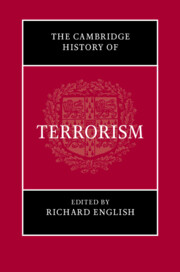Book contents
- The Cambridge History of Terrorism
- The Cambridge History of Terrorism
- Copyright page
- Contents
- Figures
- Tables
- Acknowledgements
- Contributors
- Part I Introduction
- Part II Frameworks and Definitions
- Part III Historical Case Studies in Terrorism
- 7 Terrorism in Israel/Palestine
- 8 Terrorism in the Basque Country
- 9 Terrorism in African History
- 10 The History of Terrorism in Pakistan
- 11 Political Violence in Ireland
- 12 Terrorism in the Russian Empire
- 13 Terrorism in Post-Soviet Russia
- 14 Terrorism in the Netherlands
- 15 Terrorism: An American Story
- 16 Political Violence and Terrorism in Colombia
- 17 The Paths of Terrorism in Peru
- 18 Aiqtihams (Whirlwind Attacks)
- 19 Transnational Connections
- Part IV Thematic Essays
- Part V Conclusion
- Index
- References
13 - Terrorism in Post-Soviet Russia
1990s to 2010s
from Part III - Historical Case Studies in Terrorism
Published online by Cambridge University Press: 07 May 2021
- The Cambridge History of Terrorism
- The Cambridge History of Terrorism
- Copyright page
- Contents
- Figures
- Tables
- Acknowledgements
- Contributors
- Part I Introduction
- Part II Frameworks and Definitions
- Part III Historical Case Studies in Terrorism
- 7 Terrorism in Israel/Palestine
- 8 Terrorism in the Basque Country
- 9 Terrorism in African History
- 10 The History of Terrorism in Pakistan
- 11 Political Violence in Ireland
- 12 Terrorism in the Russian Empire
- 13 Terrorism in Post-Soviet Russia
- 14 Terrorism in the Netherlands
- 15 Terrorism: An American Story
- 16 Political Violence and Terrorism in Colombia
- 17 The Paths of Terrorism in Peru
- 18 Aiqtihams (Whirlwind Attacks)
- 19 Transnational Connections
- Part IV Thematic Essays
- Part V Conclusion
- Index
- References
Summary
Where does the Russian case or, rather, the two distinct periods of terrorism in Russia, stand vis-à-vis the world’s historical waves of terrorism, from the late nineteenth century to the early twenty-first century? What are the key aspects specific to the main types of terrorism in post-Soviet Russia (i.e. terrorism by separatist-Islamist rebels in Chechnya and the broader North Caucasian region in the course of the first post-Soviet decades, and the more recent phenomenon of transnationalised, but home-grown, Islamist terrorism inspired by ‘global jihad’)? How specific are they, compared to typologically similar varieties of terrorism elsewhere? How does the rise and fall of terrorism in post-Soviet Russia relate to the factors of sociopolitical and socio-economic transition, regime type, functionality and legitimacy of state power, public perceptions and transnationalisation, in general and as compared to terrorism in the Russian Empire? How can very low levels of domestic terrorism during the Soviet period be explained? Finally, does history teach us anything? Can any lessons be gleaned from almost three decades of the more recent, contemporary history of terrorism in post-Soviet Russia? Have they been? If so, do they apply to Russia alone or more generally? These are just some of the questions that the angle taken in this volume raises in relation to Russia and that require both its main historical periods of terrorist activity to be addressed.
- Type
- Chapter
- Information
- The Cambridge History of Terrorism , pp. 313 - 332Publisher: Cambridge University PressPrint publication year: 2021

